AgrAbility Harvest 2020 An ingathering of helpful information on disability in agriculture
Diversification
Diversification is an important principle in many areas – personal finance, corporate growth, organizational funding, and others. It can represent a means of minimizing risk (“Don’t put all your eggs in one basket”), or it can reflect growth in mission.
As AgrAbility nears its 30th anniversary in 2021, it is clear that the program has diversified in significant ways since its inception. Some of the examples listed below have not only benefitted our clients but have also helped AgrAbility projects become more sustainable.
One area of growth has been the focused expansion of services to new or underserved 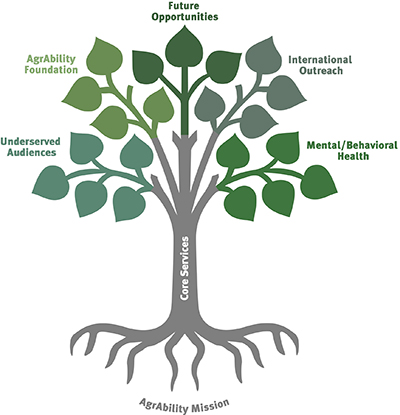 audiences. Since 2013, the National AgrAbility Project (NAP) has increased its outreach to minority farmers and farmer veterans through special events and by maintaining staff members who concentrate on those populations. Starting in 2019, AgrAbility efforts through the NAP and in Missouri and Wisconsin have been augmented with funding through USDA’s 2501 program for socially disadvantaged and veteran farmers/ranchers.
audiences. Since 2013, the National AgrAbility Project (NAP) has increased its outreach to minority farmers and farmer veterans through special events and by maintaining staff members who concentrate on those populations. Starting in 2019, AgrAbility efforts through the NAP and in Missouri and Wisconsin have been augmented with funding through USDA’s 2501 program for socially disadvantaged and veteran farmers/ranchers.
Mental and behavioral health, long-recognized as an important aspect of AgrAbility’s work, has received added emphasis in recent years through such initiatives as Mental Health First Aid, which is now offered at the AgrAbility National Training Workshop (NTW). In 2019, USDA further affirmed the importance of this issue through the establishment of the Farm and Ranch Stress Assistance Network, which is described on page 5.
International outreach is also expanding. The www.agrability.org website receives visits from more than 110 countries each year. In addition, AgrAbility welcomes international participants to the NTW, such as Mutumba Faisal of Uganda who attended last year’s conference. As a result, he has started AgrAbility for Africa (also discussed on page 5), which will be hosting its own workshop this April in Entebbe, Uganda. During 2019, NAP staff members also participated (through non-AgrAbility funds) in conferences in Canada, Ireland, and Italy, which included participants from more than 30 countries.
In addition, plans are in the works for launching the AgrAbility Foundation, an entity that could help ensure the long-term sustainability of the program and provide funding for special activities and efforts in states without AgrAbility projects.
As AgrAbility continues to mature and agriculture continues to evolve, there will undoubtedly be new options for expanding AgrAbility services. When addressing such opportunities and challenges, our dedicated staff members at the national and state levels will strive to keep the program firmly rooted in the AgrAbility mission.
Pay It Forward
by Cheryl Tevis, who was senior risk management editor with Successful Farming magazine for many years. She is currently a freelance writer and editor with AgPerspectives, Inc. and president of Iowa Women in Agriculture.
One small misstep irrevocably altered the course of Keith Posselt’s life. “As I was opening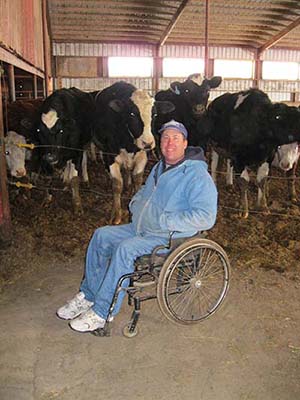 the silo door, my foot hit the safety latch, and I fell down the chute,” he says.
the silo door, my foot hit the safety latch, and I fell down the chute,” he says.
That was 21 years ago. The Hortonville, Wisconsin, farmer turned 24 years old confined to a hospital bed, with a prognosis of lower-extremity paralysis. He underwent rehabilitation at Theda Clark Medical Center in Neenah, Wisconsin, for one month, and spent two more years in outpatient physical therapy.
“I was determined to do what the doctor said I’d never do—get myself up into a standing position and walk with leg braces,” he says. Eventually, Posselt realized that strength of will alone wasn’t enough to overcome this traumatic injury.
“I never thought of having a disabling injury,” he says. “It’s what happened to other people. I had to modify my routine fairly quickly. My first major goal was driving again.”
Posselt had begun working for a neighbor when he was 13 years old. Today they are partners, growing corn, alfalfa, soybeans, and cover crops and raising Hereford beef cattle. “At first, some responsibilities shifted to my folks and other family,” he says. “It took time for someone to come here to raise me into a bucket that I made, and into the tractor.”
Assessing his farming needs
Paul Leverenz, AgrAbility of Wisconsin/Easter Seals Wisconsin FARM, recalls meeting Posselt in the hospital in 1997. After Posselt returned home to his farm in northeastern Wisconsin, Leverenz conducted a FARM assessment (Farm Assessment and Rehabilitation Methods). “Mobility and access to an old dairy freestall barn were his greatest challenges,” he says. “Another challenge was getting in and out of the tractor.”
Thanks to AgrAbility of Wisconsin’s partnership with the Wisconsin Division of Vocational Rehabilitation (DVR), Posselt applied for funding for assistive technology and equipment. He obtained automated lifts to get in and out of tractors, a swing gate that opens and closes from his chair, a system of conveyors for feeding cattle, and hydraulic tractor hitches.
“It’s much safer, and allows me to be more independent,” he says. He relies on a John Deere Gator to get around the farm.
Leverenz and AgrAbility recommended building an addition to the barn, eliminating its open front, reducing the slope to a sliding barn door gate, and easing access from Posselt’s vehicle to his wheelchair during the Wisconsin winters.
“Keith is committed to feed quality, and wanted to keep using the silo,” Leverenz says. “Silos are a challenge for people with chairs.”
Posselt adds, “Before my injury, we lifted a lot of feed bags. Now I just hit a button and let it run 10 minutes. It’s easier—not just for me––but for Mom and Dad, and my neighbor. It saves their knees from the strain of lifting.”
Like all farmers, Posselt adapts to changing production and agronomic practices. In 2006 he and his partner switched to narrow-row corn. “We had to buy a two-wheel drive tractor, and my lift wouldn’t work with it,” he says. “With help from AgrAbility and DVR, we added a different lift.”
Posselt scouts for ideas to make equipment more user-friendly. “If you give AgrAbility a chance to understand your issues, it’s there to help overcome roadblocks,” 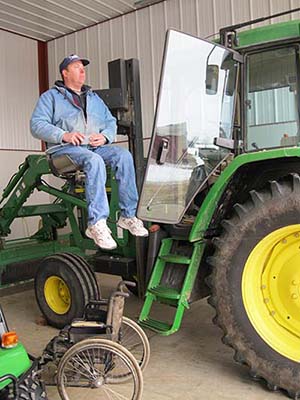 he says.
he says.
AgrAbility staff members sometimes look to other states for help in assisting clients. In Posselt’s case, AgrAbility of Wisconsin is collaborating with professionals in Kentucky to modify a skid steer loader for him. A vehicle modification specialist is building on a concept developed by the late John Hancock, former Kentucky AgrAbility Project director.
The National AgrAbility Project’s Toolbox Assistive Technology Database, an online resource, also offers more than 1,550 assistive technology solutions. www.agrability.org/toolbox
Assistive technology equalizes abilities
Posselt believes in paying it forward. He opens his farm to the 120 members of the AgrAbility Farm Network to demonstrate how he’s overcome problems.
Posselt also participates in a Neighbor-to- Neighbor program aimed at helping new AgrAbility clients see how assistive technology can help them continue farming.
“Keith’s been a mentor to many others,” Leverenz says. “He does more for us than we do for him.”
Posselt adds, “Times change, and people before me paved the way to help me get around. The Americans with Disabilities Act is the ideal standard for accessibility. My community has been supportive.”
Posselt also has been a Calumet County Youth Safety Day volunteer. “Assistive technology isn’t just for people in wheelchairs,” he says. “Eye glasses, hearing aids, canes, light switches, and remote controls for cars and tractors serve the same purpose. We need to teach the next generation that everyone has challenges and needs help. Being in a wheelchair isn’t so different.”
He’s also a founding member of the Easter Seals Wisconsin Calf Project. Members can donate feed or a calf. The Project has raised $40,000 for Easter Seals Wisconsin FARM Program since 2012.
When Posselt was named Easter Seals Wisconsin’s 2014 Outstanding Volunteer, he demonstrated his modest, self-deprecating sense of humor. “This award goes against everything I was taught in life,” he said in his acceptance speech. “It shows I can get noticed in a positive way while sitting around all day long.”
Posselt, who describes himself as physically challenged, added, “Stairs are one physical challenge I face in life. I find ways to do it using elevators, ramps, a lift from family and friends, and always lots of people offering a good old-fashioned swift kick.”
His SUV is equipped with hand controls, and his wheelchair is collapsible. Posselt has driven to National AgrAbility Project conferences and workshops in Tennessee, Colorado, New York, Kentucky, and Maine. “If you love what you’re doing, you do everything you can to keep going, and enjoy it,” Posselt says.
“AgrAbility isn’t just about one person, but the whole group coming together to share ideas to make farming easier, and help give us all purpose in life.”
Keith Posselt is scheduled to participate in the 2020 AgrAbility National Training Workshop in Madison, Wisconsin. Get more information at www.agrability.org/ntw.
The Buzz about Bees
Beekeeping is increasingly popular, both as an agricultural enterprise and as a hobby. Touted as a benefit to the environment, beekeeping can also be financially profitable. And it’s not limited to rural areas, as beekeeping is expanding in cities and suburbs. Here are some tools to make the job less physically demanding.
Drebbieville Hive with Slide-Out Frames
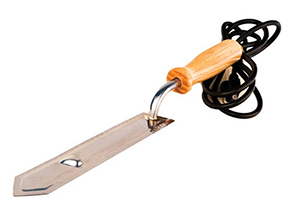
An alternative to the common Langstroth, this hive eliminates having to lift heavy, honey-filled frames because these frames slide out from the rear. The Drebbieville includes 30 AZ frames, interchangeable queen excluder and separator/blocker, bottle feeder, entrance reducers/blockers, and screened windows with reversible latches and door. (Visit www.thebeeshop.com)
Horizontal Top-Bar Hive
 This is a single-story, frameless hive in which the comb hangs from removable bars. Having only one box, it requires no heavy lifting or extra equipment. Its sloping wall allows the comb to be built in a manageable size and discourages comb attachment to the wall. Harvesting involves simply cutting off the comb, leaving a space for the bees to rebuild. (Visit www.tinyurl.com/ top-bar)
This is a single-story, frameless hive in which the comb hangs from removable bars. Having only one box, it requires no heavy lifting or extra equipment. Its sloping wall allows the comb to be built in a manageable size and discourages comb attachment to the wall. Harvesting involves simply cutting off the comb, leaving a space for the bees to rebuild. (Visit www.tinyurl.com/ top-bar)
Electric-Heated Uncapping Knife
 For many (especially those with limited hand strength), this is the tool of choice for removing the honeycomb’s beeswax cap to begin the extracting process. It has a thermostat in the blade that heats it to a pre-set optimum temperature to help it easily glide down the comb. The tool is 10-12 inches long with 2-inch-wide, double-edged, serrated, stainless steel blade and wooden handle, plus 8-10 foot grounded electrical cord. (Visit www.tinyurl.com/uncapping-knife)
For many (especially those with limited hand strength), this is the tool of choice for removing the honeycomb’s beeswax cap to begin the extracting process. It has a thermostat in the blade that heats it to a pre-set optimum temperature to help it easily glide down the comb. The tool is 10-12 inches long with 2-inch-wide, double-edged, serrated, stainless steel blade and wooden handle, plus 8-10 foot grounded electrical cord. (Visit www.tinyurl.com/uncapping-knife)
Manual Hive Lifter/Mover
 This two-wheeled, dolly-type lifter/ mover is designed to reduce the physical effort required to hoist and transport a hive. To operate, one centers it so the gripper arms contact the hive on both sides, lowers the fastening lever so the arms squeeze the hive, cranks the handle to lift the hive, then leans the tool back to transport or stack the hive. (Visit www.beehivelifters.com)
This two-wheeled, dolly-type lifter/ mover is designed to reduce the physical effort required to hoist and transport a hive. To operate, one centers it so the gripper arms contact the hive on both sides, lowers the fastening lever so the arms squeeze the hive, cranks the handle to lift the hive, then leans the tool back to transport or stack the hive. (Visit www.beehivelifters.com)
Hummerbee Apiary Forklift
 Designed to move pallets of hives over rough terrain, this four-wheel drive, articulated, diesel-powered forklift has a two-speed hydrostatic transmission/ hydraulic system. It features a 10 1/2-foot mast lift, joystick mast controls, 42-inch forks, ROPS, LED lights, and optional accessories. (Visit www. hummerbee.com)
Designed to move pallets of hives over rough terrain, this four-wheel drive, articulated, diesel-powered forklift has a two-speed hydrostatic transmission/ hydraulic system. It features a 10 1/2-foot mast lift, joystick mast controls, 42-inch forks, ROPS, LED lights, and optional accessories. (Visit www. hummerbee.com)
Bucket-Bench Pail Holder
 This device allows for the hands-free transfer of slow-draining honey from one container to another. It attaches to the lip of the honey-receiving bucket; then the honey-containing bucket is lodged into the two integrated hooks, which results in a 45º tilt for the draining process. (Visit www.tinyurl.com/ pail-holder)
This device allows for the hands-free transfer of slow-draining honey from one container to another. It attaches to the lip of the honey-receiving bucket; then the honey-containing bucket is lodged into the two integrated hooks, which results in a 45º tilt for the draining process. (Visit www.tinyurl.com/ pail-holder)
* The authors assume no liability in connection with any use of the products discussed and make no warranty (express or implied) in that respect. References to products are not intended as endorsements to the exclusion of others that may be similar.
AbleData AT database
 If you know much about AgrAbility, you’re probably familiar with The Toolbox Assistive Technology Database. However, you should also know about an even larger catalog of AT – the AbleData database. While it doesn’t focus on agricultural AT, AbleData boasts more than 40,000 entries that fall into 20 different product categories, including:
If you know much about AgrAbility, you’re probably familiar with The Toolbox Assistive Technology Database. However, you should also know about an even larger catalog of AT – the AbleData database. While it doesn’t focus on agricultural AT, AbleData boasts more than 40,000 entries that fall into 20 different product categories, including:
- wheeled mobility
- aids to daily living
- transportation
- deaf and hard of hearing
- blind and low-vision
- computers
- housekeeping (food preparation, cleaning, shopping, etc.)
AbleData also offers other publications and guides, including such titles as, “AT for Hikers with a Mobility or Lower Extremity Disability,” “AT for Preventing Falls,” and “Controlling Your Cursor with AT: Adapted Computer Mice.”
AbleData is supported by the National Institute on Disability, Independent Living, and Rehabilitation Research. To access the database and other resources, visit abledata.acl.gov.
FRSAN funded to assist with farm/ranch stress
Much has been publicized in the media about suicide and farm stress, which are issues often related to such factors as drops in farm income, the trade war with China, low dairy prices, and natural disasters.
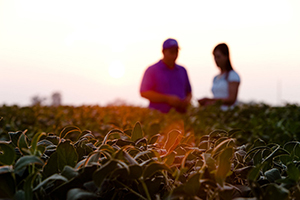
Photo: United Soybean Board
To help agricultural workers deal with mental and behavioral health concerns, USDA’s National Institute of Food and Agriculture (NIFA) has established the Farm and Ranch Stress Assistance Network (FRSAN) Program. According to NIFA, the purpose of FRSAN is “to establish a network that connects individuals who are engaged in farming, ranching, and other agriculture-related occupations to stress assistance programs. The establishment of a network that assists farmers and ranchers in time of stress can offer a conduit to improving behavioral health awareness, literacy, and outcomes for agricultural producers, workers and their families.1”
First authorized under the 2008 Farm Bill, FRSAN was appropriated $10 million in 2019. Initial funding went to establish four regional centers around the U.S. with the West Center led by Washington State University Extension, the South Center led by AgriSafe Network, the North Central Center led by Iowa State University, and the Northeast Center led by the National Young Farmers Coalition.
The centers plan to become clearinghouses of farmer assistance programs and to support stress hotlines, drug abuse information dissemination, peer support activities, and the training of service providers.
A webinar related to FRSAN was included in the 2020 AgrAbility Virtual National Training Workshop. Access the recording at www.agrability.org/online-training/virtualntw.
AgrAbility for Africa
Farmers with disabilities in the U.S. are often impacted by resource limitations, such as a lack of service providers in rural areas and few options for financing expensive assistive technology. However, those issues can be compounded exponentially for farmers with disabilities in developing countries where resources for the overall population may be severely limited.
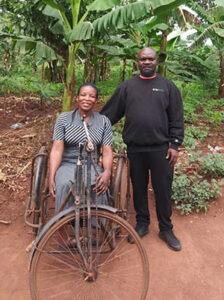
Mutumba Faisal, right
To assist African farmers with disabilities, Mutumba Faisal of Uganda founded AgrAbility for Africa. He had traveled to the U.S. in 2019 for the AgrAbility National Training Workshop in Lincoln, NE. Now he and his team are planning their own 2020 training workshop scheduled for April 27- 29 in Entebbe, Uganda. The National AgrAbility Project hopes to send a representative to participate in this inaugural event for the continent of Africa.
More information about the Entebbe conference and about AgrAbility for Africa can be found at www.agrabilityafrica.org.
USDA – NIFA
2019 brought radical changes to AgrAbility’s federal parent/funding agency – USDA’s National Institute of Food and Agriculture (NIFA). Through a well-publicized (and controversial) decision, the agency was moved last fall from Washington, D.C., to Kansas City, Missouri, along with USDA’s Economic Research Service.
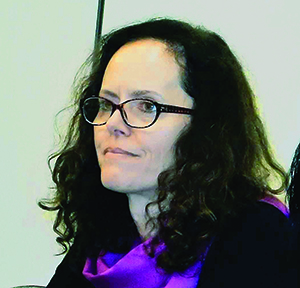
Aida Balsano
Among the consequences of that move was the departure of a significant number of NIFA employees. One of those was Aida Balsano, who had been AgrAbility’s national project leader since 2013. Aida was a strong advocate and ambassador for AgrAbility and was very supportive of AgrAbility staffs at both the state and national levels. The National AgrAbility Project extends its heartfelt thanks to Aida for all her efforts over the years.

Bradley Rein, USDA Photo by Preston Keres
While Aida’s departure is a significant loss to AgrAbility, program staff members are thankful that longtime national project leader Brad Rein will be coordinating NIFA’s AgrAbility efforts for the time being. Brad was the original project officer when AgrAbility was launched at the federal level in 1991, and he continued in that role until Aida assumed those responsibilities in 2013. Brad will remain at USDA’s offices in Washington, D.C.
USDA Program Specialist LeLan Dixon, who assisted Aida in facilitating AgrAbility activities, will assist Brad for now. Both Lelan and Brad are planning to attend the National Training Workshop in Madison, Wisconsin, this spring.
NIFA has settled on a permanent location in Kansas City and is in the process of hiring new staff. Further USDA personnel changes related to AgrAbility will likely come in 2020.
Washington State AgrAbility
For more than a decade, numerous individuals and organizations have worked to establish a greater AgrAbility presence in the Pacific Northwest. In addition to a National AgrAbility staff member living in Oregon for several years, regional AgrAbility workshops were held in Washington and Oregon, and funding proposals were submitted to USDA by Extension staff members from those states.
Finally, in 2019, Washington State University (WSU) was awarded a four-year AgrAbility project grant. Headquartered at Skagit County Extension, the program partners with organizations that include the Northwest Access Fund, Washington Assistive Technology Act Program (WATAP), Washington Division of Vocational Rehabilitation, WSU Medical School, Viva Farms, and Growing Veterans.
In addition to providing standard AgrAbility services like farm assessments, the project plans to establish an online “pathway to services” network for assisting consumers in finding resources. Staff also plan a variety of farm-based demonstrations of assistive technology plus an AT lending library to encourage higher acceptance rates of such technologies. Also planned is special outreach to some of the state’s underserved populations, such as Native Americans and migrant/seasonal farmworkers. Since Washington is divided by the Cascade Mountain Range into two main sections, AgrAbility staff will split work assignments based on geographical region.
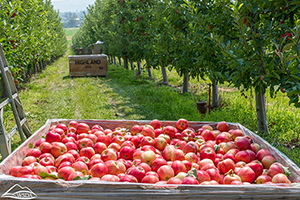
Photo: Washington State Department of Agriculture
According to the National Association of State Departments of Agriculture, Washington ranks first in the U.S. for production of 11 commodities, including apples, sweet cherries, pears, hops, and red raspberries.1 About 70% of Washington’s total agricultural receipts are from crops, and about 30% are from livestock products, including dairy. Overall, Washington ranks 14th among the states in total agricultural receipts.2
1 https://www.nasda.org/organizations/washington-state-department-of-agriculture
Veteran outreach remains strong
Agriculture continues to be a popular career option for military veterans, and AgrAbility services to this population continue to expand.
Numerous AgrAbility staff members joined nearly 500 other participants at the Farmer 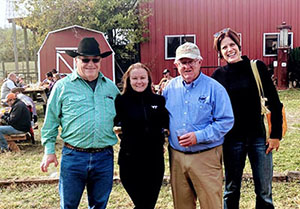 Stakeholders Conference sponsored by the Farmer Veteran Coalition (FVC) last November in Austin, Texas. Pictured at the event’s opening barbeque are, from left to right, FVC Executive Director Michael O’Gorman, North Carolina AgrAbility Project Director Crystal Kyle, National AgrAbility Project Director Bill Field, and FVC Deputy Directory Sarah Dachos. Also during that meeting, the Farmer Veteran Coalition of Illinois was chartered, with Kelly Gagnon of Illinois AgrAbility Unlimited as one of its board members.
Stakeholders Conference sponsored by the Farmer Veteran Coalition (FVC) last November in Austin, Texas. Pictured at the event’s opening barbeque are, from left to right, FVC Executive Director Michael O’Gorman, North Carolina AgrAbility Project Director Crystal Kyle, National AgrAbility Project Director Bill Field, and FVC Deputy Directory Sarah Dachos. Also during that meeting, the Farmer Veteran Coalition of Illinois was chartered, with Kelly Gagnon of Illinois AgrAbility Unlimited as one of its board members.
Texas AgrAbility continues its BattleGround to Breaking Ground program, which provides agricultural training to veterans through workshops, webinars, and other means. Also, Indiana AgrAbility was part of a successful grant proposal in 2019 for the USDA’s AgVets program. It will partner with other organizations to provide training and on-farm internships for veterans in Indiana and surrounding states.
Many other state AgrAbility projects also have veteran-related initiatives, and at least nine sessions at the upcoming NTW will address veterans’ issues.
Remembering John Hancock
The AgrAbility family was saddened by the passing of John Hancock, long-time project director of Kentucky AgrAbility, on December 8, 2019, at age 59.
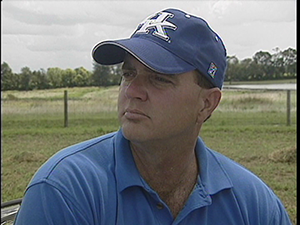 John started his career with University of Kentucky Extension as a county agent. However, in the summer of 1984 at the age of 24, he was involved in a motorcycle crash that left him with paraplegia. In 1993, he became the leader of the Kentucky AgrAbility program and continued in that role until 2019.
John started his career with University of Kentucky Extension as a county agent. However, in the summer of 1984 at the age of 24, he was involved in a motorcycle crash that left him with paraplegia. In 1993, he became the leader of the Kentucky AgrAbility program and continued in that role until 2019.
Over his tenure with the program, John helped thousands of farmers and agricultural workers with disabilities in Kentucky and throughout the United States, Canada, and as far away as Australia. He knew the problems these individuals and their families faced because he faced them himself every day, and he was instrumental in finding assistive technology to help minimize the effects of the injury or illness.
John once said, “Just like I was able to return to my job, a farmer who becomes disabled can return to his farm. He may need a bit of help here and there, but for the most part he is able to grow anything from a garden to thousands of acres….”
Thank you to Linda Bokros of Kentucky AgrAbility for contributing to this article.
NTW heads to Wisconsin
“The Big Dance” usually refers to the NCAA men’s basketball tournament, but AgrAbility’s version is its annual National Training Workshop. This year’s conference, featuring four days of plenary sessions, tours, and breakout presentations, is scheduled for Madison, Wisconsin, on March 23-26.

Photo by Jordan Richmond
Monday’s preconference sessions will again include Mental Health First Aid, a popular eight-hour workshop that trains participants to be “first responders” in mental health crises. Also available on Monday is a tour of the University of Wisconsin Rehabilitation Hospital, among other offerings.
The Tuesday evening banquet will feature keynote speaker Davon Goodwin, a veteran, farmer, motivational speaker, and North Carolina AgrAbility client. Davon has been featured on several national media releases, including the PBS “Soldier’s Harvest” series.
Thursday’s tour stops include the U.S. Dairy Forage Research Center on the University of Wisconsin-Madison campus, AgrAbility client farms, a large dairy and cheese-making operation, and the Kuhn manufacturing plant.
Make plans to participate in this great conference. (You can still catch all of March Madness too!)
 Madison, Wisconsin, is the site for this year’s AgrAbility National Training Workshop, scheduled for March 23-26. Headquartered at the Madison Concourse Hotel, the conference will also explore regional sites through Monday and Thursday tours. In addition, Mental Health First Aid will be offered as a pre-conference session on March 23.
Madison, Wisconsin, is the site for this year’s AgrAbility National Training Workshop, scheduled for March 23-26. Headquartered at the Madison Concourse Hotel, the conference will also explore regional sites through Monday and Thursday tours. In addition, Mental Health First Aid will be offered as a pre-conference session on March 23.
 Keynote speaker for Tuesday’s banquet is Davon Goodwin, a farmer veteran and AgrAbility client from North Carolina. In 2010, he was deployed in Afghanistan where he was injured by an IED explosion. Davon has been featured in a number of media productions, including “The War Within” and “Soldier’s Harvest.”
Keynote speaker for Tuesday’s banquet is Davon Goodwin, a farmer veteran and AgrAbility client from North Carolina. In 2010, he was deployed in Afghanistan where he was injured by an IED explosion. Davon has been featured in a number of media productions, including “The War Within” and “Soldier’s Harvest.”
2020
- March 26-29: AOTA Annual Conference & Expo Boston, MA www.aota.org
- June 3-5: World Pork Expo Des Moines, IA www.worldpork.org
- June 22-26: International Society for Agricultural Safety & Health (ISASH) Annual Conference Asheville, NC www.isash.org
- July 7-10: RESNA Annual Conference Arlington, VA www.resna.org
- July 12-15: ASABE Annual International Meeting Omaha, NE www.asabemeetings.org
- July 19-24: National Association of County Agricultural Agents (NACAA) Annual Meeting Virginia Beach, VA www.nacaa.com
- July 29-31: Empire Farm Days Seneca Falls, NY www.empirefarmdays.com
- August 1-4: Disabled American Veterans National Convention Dallas, TX www.dav.org/events
- August 20-22: Amputee Coalition National Conference Washington, DC www.amputee-coalition.org
- September 1-3: Farm Progress Show Boone, IA www.farmprogressshow.com
- September 15-17: Husker Harvest Days Grand Island, NE www.huskerharvestdays.com
- September 22-24: Farm Science Review London, OH www.fsr.osu.edu
- September 29 – October 3: World Dairy Expo Madison, WI www.worlddairyexpo.com
- October 9-12: APRIL Annual Conference Orlando, FL www.april-rural.org
- October 20-22: Sunbelt Ag Expo Moultrie, GA www.sunbeltexpo.com
- October 28-31: National FFA Convention Indianapolis, IN www.convention.ffa.org
2021
- January 5-7: Keystone Farm Show York, PA www.keystone-farm-show.com
- February 9-11: World Ag Expo Tulare, CA www.worldagexpo.com